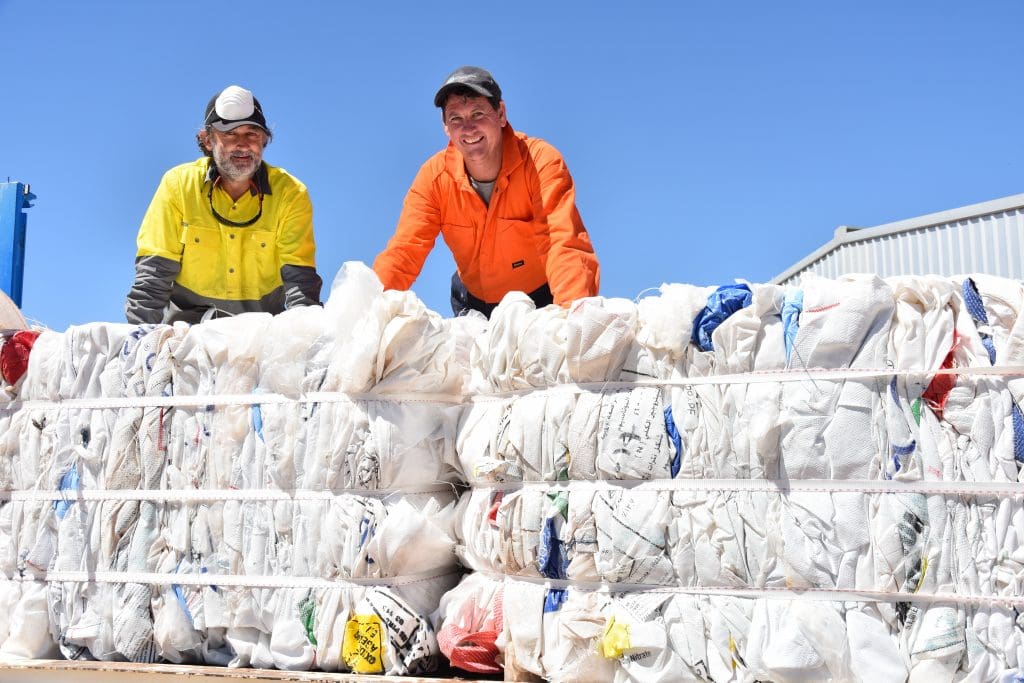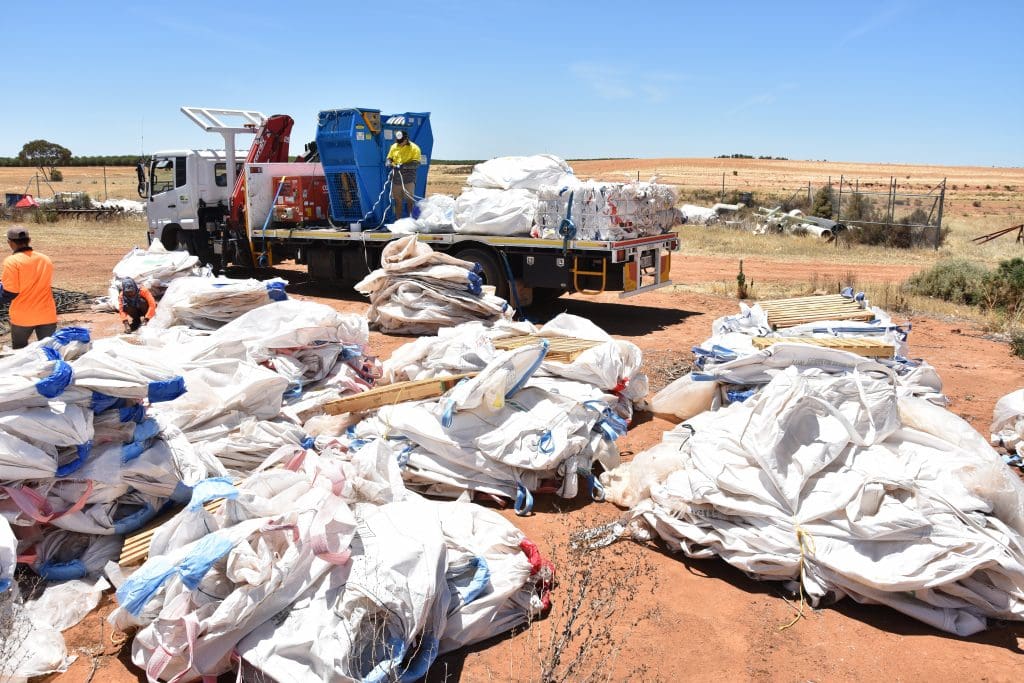
FWR’s Stewart Ford and Stephen Richards with baled bulk fertiliser bags during a collection at Olam’s ‘Menegazzo’ almond orchard in the Kenley area of Victoria’s Sunraysia region. Each bale comprises about 65 bags and weighs around 210 kilograms.
LOOMING environmental regulations and new state laws already in place are building pressure on the Australian fertiliser industry to effectively manage waste and recyclable packaging, such as used fertiliser bags.
The changes will impact, in particular, large bulk bags that have largely been exported to Asia. By mid-2021 and in-line with international agreements, exports of waste and recyclable plastics will no longer be permitted from Australia.
With new laws in several states, incorrect disposable deemed to be harming the environment also can result in massive fines and/or imprisonment.
It has meant fertiliser manufacturers need to look at systems for future regulatory compliance, as well as protecting their brand and maintaining a strong commitment to the environment and their corporate and social responsibilities, while producers, or users, are under obligations to ensure correct disposal.
The developments have increased the spotlight on Farm Waste Recovery (FWR), which has been collecting large bulk bags from properties for some major manufacturers signed up to its industry stewardship program.
The FWR service has collected more than 3000 tonnes of plastic since commencing four years ago and will soon come under the new banner, Big Bag Recovery, covering all industries.
Recovery is expected to jump dramatically to around 48,000t annually, commensurate with the volume of bags imported into Australia. FWR will continue to collect unbranded waste plastics.
The business has mainly exported the bags to Asia and has plans to build a network of regional processing facilities to establish a full circle recycle industry across the country under its parent, Industry Waste Recovery.
The new recycle industry would create hundreds of regional jobs and refine the waste back to a resin before manufacturing various new plastic products.
“The resin can be used to manufacture products like evaporation balls to go on water storages for seven to 10 years before being harvested, refined back to a resin and starting again. This is true recycling,’’ FWR’s Stephen Richards said.
“As technology increases, it can be used to manufacture more sophisticated products like internal walls used in housing. Ultimately, it is about preventing the need for manufacturing new plastic.’’
The bags also have been recycled into outdoor furniture, including park benches. About 60 bulk bags, converting to 200 kilograms of plastic, can be recycled into a park bench.
Stewardship program
FWR has recently been collecting bags in the almond industry in Victoria’s Sunraysia region with manufacturers including Haifa Australia, one of the first companies to sign up to its stewardship program and which has been a major advocate with other suppliers and producers to help ensure the industry’s future environmental sustainability.
Haifa is one of the major suppliers of water soluble nutrients to the horticulture industry.
It has had strong success in Australia with its Multi-K potassium nitrate fertiliser, Poly-Feed nitrogen, phosphorus and potassium formulas, and Multicote controlled release nutrition products.
It also recently launched several innovative, low sodium fertilisers for high quality horticulture and greenhouse systems.
The company has a strong brand in the horticulture, vegetable and nursery industries, distributing in all States through major suppliers as well as independent retailers.
“Haifa has been one of the leading organisations behind the stewardship program. It has been actively promoting it in the different industry segments and particularly the almond industry,’’ Mr Richards said.

Stacked bulk fertiliser bags ready for collection from the fenced-off site at Olam’s ‘Campbell’ almond property in the Kenley area of Victoria’s Sunraysia region.
Source: FWR

It’s time all agriculture’s fertiliser, seed, animal feed etc bags had a recycle deposit value just like plastic bottles in some states. Say $5 per one tonne bag and 5 cents for each 20kg fertiliser, seed and stock feed bags. Farmers, sporting clubs, social clubs would have an incentive for collecting and recycling these bags. Alternatively suppliers and retailers of agricultural inputs packed in bags should be required to take the bags back from the farmer for recycling.